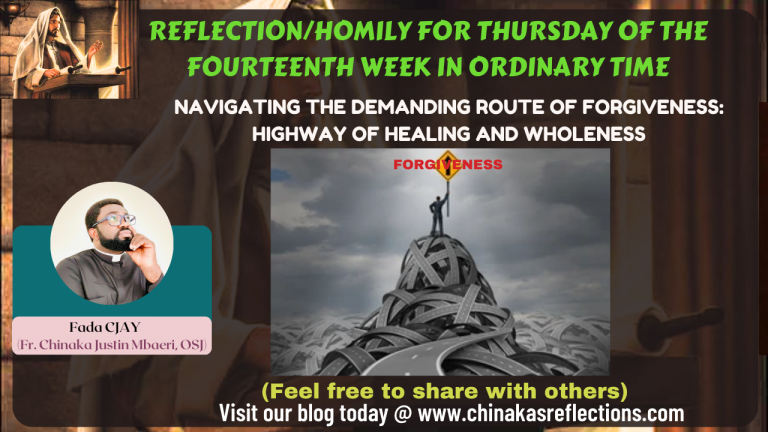NAVIGATING THE DEMANDING ROUTE OF FORGIVENESS: HIGHWAY OF HEALING AND WHOLENESS
First Reading: 44:18-21,23-29,45:1-5
Responsorial Psalm: Ps 104(105):16-21
Gospel Reading: Matthew 10:7-15
____________________________________
In the complex weave of human existence, the path to reconciliation and forgiveness is often strewn with thorns, demanding courage and strength to traverse its treacherous terrain. It requires us to navigate the complexities of our emotions and confront the scars of past transgressions. As the famous American writer and humourist, Mark Twain (whose real name was Samuel Clemens) wisely opines, “Forgiveness is the fragrance that the violet sheds on the heel that has crushed it”; and in consonance with the assertion of Lewis B. Smedes, a Christian author and theologian, “To forgive is to set a prisoner free and discover that the prisoner was you,” the struggle we face when confronted with the task of reconciliation and forgiveness is concretely captured and it resonates deeply, reminding us that the act of forgiveness is not an easy task; rather, it emanates from a place of profound strength and resilience. Embedded within the fabric of our concrete life experiences, the central theme of reconciliation and forgiveness is illuminated by the timeless wisdom contained in today’s liturgical readings.
Taking the Gospel Reading (Matthew 10:7-15) as our point of departure, our understanding of today’s theme finds resonance in Christ’s instruction to the Twelve going on a mission, “As you go, proclaim that the kingdom of heaven is close at hand.” The kingdom of God, dear friends, is the totality of the universe, where the will of God reigns as utopia—a realm marked by compassion, forgiveness, pardon, reconciliation, and peace. It is a realm that ushers in healing, cleansing, and the expulsion of evil from our midst, as seen in the Gospel Reading. Little wonder when we utter the words, “Thy kingdom come” in the Lord’s prayer, it is followed by “Thy will be done on earth as it is in heaven.” And at the heart of this divine will lies love – which in the context of today’s readings embodies reconciliation, pardon, and forgiveness. It is no wonder, then, that our petition for forgiveness follows closely in the Lord’s prayer.
Likewise, the responsorial psalm speaks of divine intervention and redemption, showcasing God’s faithfulness in guiding His people through adversity. It reminds us that forgiveness and compassion are not merely virtues to be found in humanity but divine attributes as well. Through forgiveness, God liberates the oppressed and provides a path toward spiritual salvation and liberation.
And turning our attention to the First Reading from the Book of Genesis (44:18-21,23-29,45:1-5), the narrative of Joseph and his brothers offers a poignant illustration of the transformative power of forgiveness and reconciliation. Amidst the complexity of human relationships and the depths of betrayal, Joseph extends the hand of forgiveness to his brothers, embodying the redemptive potential of reconciliation. “I am your brother, Joseph,” he declares, “the one you sold into Egypt. And now, do not be distressed, do not reproach yourselves for having sold me here. It was really for the sake of saving lives that God sent me here ahead of you.” In these words, we witness the profound truth that forgiveness holds the key to healing wounds and mending the shattered pieces of our existence. Joseph’s act of grace becomes a guiding light, illuminating the path of reconciliation that transcends time and circumstance.
Dear friends in Christ, as we delve into these profound truths, let us be deeply moved by the call to embrace reconciliation and empathy in our own lives, and particularly see it as a way of setting ourselves free from life’s prison as stated at the beginning of our reflection. Also, returning to the quote of Mark Twain “Forgiveness is the fragrance that the violet sheds on the heel that has crushed it.” Here, inasmuch as the violet is being crushed and hurt, it still releases its sweet smell into the air. Likewise, forgiveness is when you decide to let go of bad feelings or anger towards someone who has done something wrong or hurtful to you. It is like the nice smell that the violet releases. When someone hurts you, instead of staying upset and angry all the time, forgiving them is like spreading a sweet fragrance around you. The story of Joseph teaches us that forgiveness has the power to mend fractured relationships and reveal hidden blessings. Joseph was like the crushed violet, yet he let his sweet fragrance spread around when he met his brothers, and that was able to bring lasting healing to the Family of Jacob. The psalmist’s reflection reminds us that even in the darkest moments, divine grace orchestrates a path of redemption, leading us toward reconciliation and wholeness. And in Christ’s teachings, we are reminded of the urgent need for empathy, mercy, and selfless love in a world plagued by division and strife.
Therefore, as we immerse ourselves in these readings, let us be moved by the profound truths they carry, reflecting on how we can embody reconciliation and empathy in our own lives. As we embrace the Kingdom of God which is close at hand, may we live as children of that Kingdom by doing the will of God on earth as it is in heaven through heeding the call to be agents of healing, practicing forgiveness, extending compassion, and spreading love in a world yearning for unity and understanding. For it is through the transformative power of reconciliation that we embrace our shared humanity, fostering a world that flourishes with grace, compassion, and hope—just as the ancient pearls of wisdom do within these sacred texts.
(CLICK HERE FOR THE NEXT DAY’S REFLECTION: REFLECTION/HOMILY FOR FRIDAY OF THE FOURTEENTH WEEK IN ORDINARY TIME)
Shalom!
© Fr. Chinaka Justin Mbaeri, OSJ
Paroquia Nossa Senhora de Loreto, Vila Medeiros, São Paulo, Brazil
nozickcjoe@gmail.com / fadacjay@gmail.com
__________________________
Have you prayed your rosary today?


